[Most Recent Entries] [Calendar View]
Tuesday, March 5th, 2024
| Time | Event |
| 8:01a | The Puzzle of Docudramas — Pretty Much Pop: A Culture Podcast #167
When we’ve already heard about someone’s personal scandal in the news, do we need to also see it dramatized with A‑list actors? Your hosts Mark Linsenmayer, Lawrence Ware, Sarahlyn Bruck, and Al Baker discuss Todd Haynes’ 2023 film May December fictionalizing the long-aftermath of the much publicized Mary Kay Letourneau story. The main events of May December are fictional (based on a story by screenwriter Samy Burch along with Alex Mechanik): An actress (Natalie Portman) researching her future role visits the renamed Letourneau (Julianne Moore) and her now-adult husband (Charles Melton), whom she seduced (molested) starting at age 12. So is this art film fundamentally unlike the other recent dramatizations that we touch on, including Joe vs. Carole, Inventing Anna, Dirty John, The Act, The Shrink Next Door, and The Thing About Pam? We also talk about Reality. as an example of films depicting how horrible it is to be arrested. Note that while Amanda Knox’s story was made into a TV movie, the prestige TV drama version is still in process. Her podcast is called Labyrinths. One of the articles we reviewed about May December is this one from Vox. Follow us @law_writes, @sarahlynbruck, @ixisnox, @MarkLinsenmayer. Hear more Pretty Much Pop, including recent episodes that you haven’t seen on this site. Support the show and hear bonus talking for this and nearly every other episode at patreon.com/prettymuchpop or by choosing a paid subscription through Apple Podcasts. This podcast is part of the Partially Examined Life podcast network. Pretty Much Pop: A Culture Podcast is the first podcast curated by Open Culture. Browse all Pretty Much Pop posts. |
| 9:00a | The Decimal Point Is 150 Years Older Than We Thought, Emerging in Renaissance Italy
Historians have long thought that the decimal point first came into use in 1593, when the German mathematician Christopher Clavius wrote an astronomy text called Astrolabium. It turns out, however, that the history of the decimal point stretches back another 150 years–to the work of the Venetian merchant Giovanni Bianchini. In his text Tabulae primi mobilis, written during the 1440s, Bianchini used the decimal point to calculate the coordinates of planets. In so doing, he invented a system of decimal fractions, which, in turn, made the calculations underpinning modern science more efficient and less complex, notes Scientific American. Glen Van Brummelen, a historian of mathematics, recently recounted to NPR how he discovered Bianchini’s innovation:
In a new article appearing in the journal Historia Mathematica, Van Brummelen explains the historical significance of the decimal point, and what this discovery means for the historical development of mathematics. You can read it online. Related Content Trigonometry Discovered on a 3700-Year-Old Ancient Babylonian Tablet How the Ancient Greeks Shaped Modern Mathematics: A Short, Animated Introduction The Map of Mathematics: An Animated Video Shows How All the Different Fields in Math Fit Together |
| 10:00a | Hear Nirvana’s “Smells Like Teen Spirit” Performed in Classical Latin By the early nineteen-nineties, at least in the United States, Latin instruction in schools wasn’t what it had once been. Students everywhere had long been showing impatience and irreverence about their having to study that “dead language,” of course. But surely it had never felt quite so irrelevant as it did in a world of shopping malls, cable television, and the emerging internet. Thirty years ago, few students would have freely chosen to do their Latin homework when they could have been, say, listening to Nirvana. But now, in the age of Youtube, they can have both at once. In the video above, the_miracle_aligner covers “Smells Like Teen Spirit” in a medieval (or “bardcore”) style, using not just period instrumentation but also a translation of its lyrics into Latin. Since its release a few years ago, this Colosseum-worthy version of the song that defined grunge has drawn thousands upon thousands of appreciative comments from enthusiasts of Nirvana and Latin alike. As one of the latter points out, “most Latin words rhyme because of conjugation,” and when they don’t, the language’s unusual freedom of word order provides plenty of opportunity to make it work. Still, the song contains more than its share of truly inspired choices: another commenter calls it “just immaculate” how “the ‘hello, how low’ rhymes as ‘salvé, parve.’ ” As tends to be the way with those of us here in the twenty-first century inclined to dig deep into a language like Latin, some take the opportunity to get into character: “I vividly remember the night Gaius Kurtus Cobainius the Elder premiered this song at the Amphitheater of Pompey in the Summer of 91AD. The plebs went nuts and were throwing Sesterti and Denari on the stage. I even saw a patrician woman lift her tunic! Oh how I miss those days.” In whatever language it’s sung, the instantly recognizable “Smells Like Teen Spirit” will send any Generation-Xers in earshot right back to the strenuous slacking of their own youth. And the cry “Oblectáte, nunc híc sumus” would have cut as sharply in the age of bread and circuses as it did in the MTV era — or, for that matter, as it does now. Related content: Learn Latin, Old English, Sanskrit, Classical Greek & Other Ancient Languages in 10 Lessons Nirvana’s “Come As You Are” Played By Musicians Around the World The First Live Performance of Nirvana’s “Smells Like Teen Spirit” (1991) What Ancient Latin Sounded Like, And How We Know It Based in Seoul, Colin Marshall writes and broadcasts on cities, language, and culture. His projects include the Substack newsletter Books on Cities, the book The Stateless City: a Walk through 21st-Century Los Angeles and the video series The City in Cinema. Follow him on Twitter at @colinmarshall or on Facebook. |
| << Previous Day |
2024/03/05 [Calendar] |
Next Day >> |


